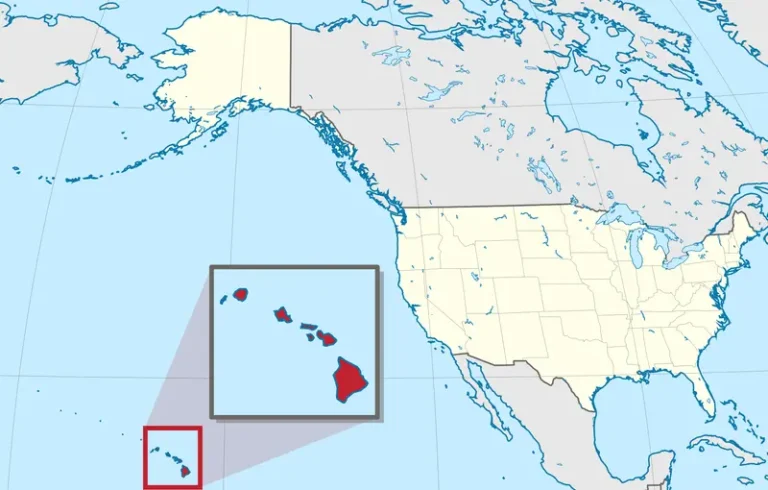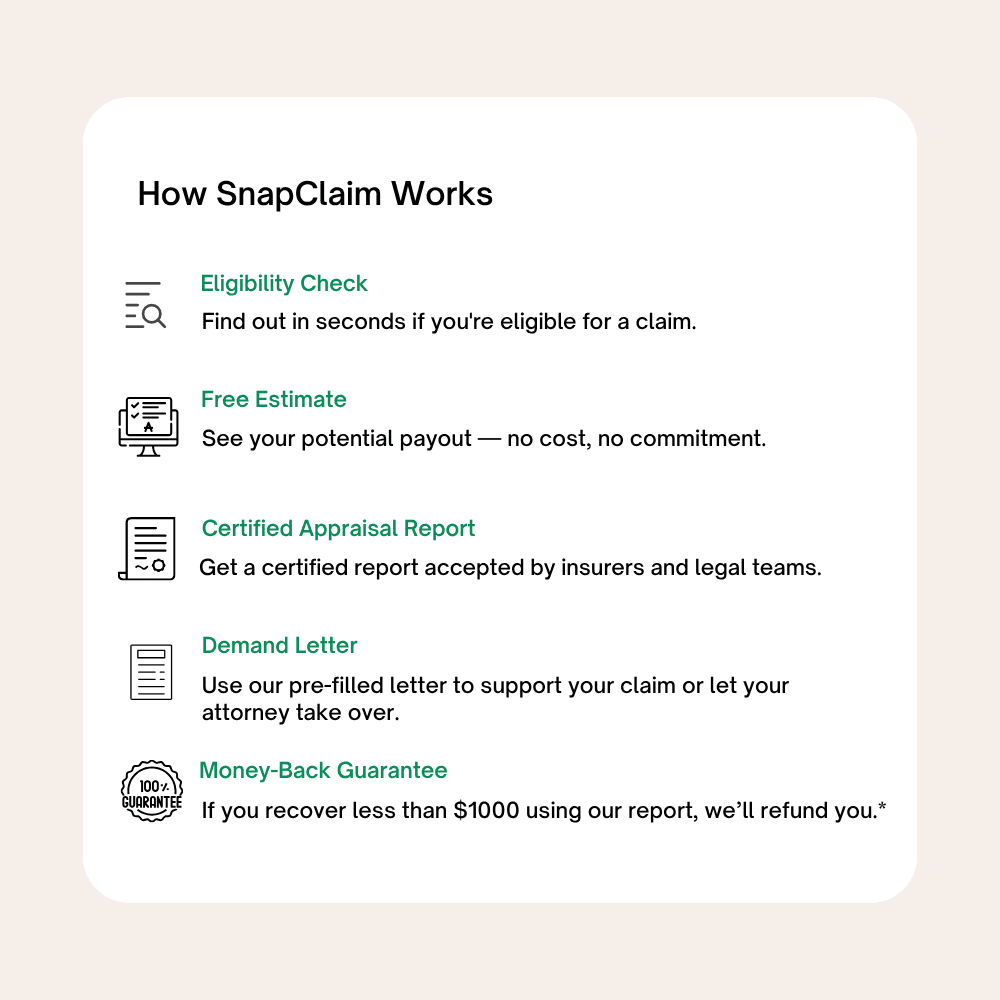Total Loss Appraisal in
Hawaii
Get Your Free Estimate in a Minute!
If your car was declared a total loss and you’re not happy with the insurance payout, you have the right to request a Hawaii total loss appraisal. SnapClaim helps you dispute unfair insurance valuations with certified, data-backed reports that show your vehicle’s true fair market value.
No credit card required [Takes less than 30 second]
Total Loss Appraisal in Hawaii: What You Need to Know

Hawaii Total Loss Appraisal — Get the Full Value of Your Totaled Vehicle
If your vehicle was declared a total loss and the insurance offer feels too low, you have the right to obtain an independent Hawaii total loss appraisal. Whether the accident happened in Honolulu, Hilo, Kailua, Pearl City, Kahului, or anywhere across the islands, SnapClaim helps you recover your vehicle’s true fair market value (ACV) and secure the full payout you’re owed. Our certified total loss appraisal reports are data-driven, USPAP-aware, and accepted by insurers and small-claims courts across Hawaii.Why Get a Total Loss Appraisal in Hawaii?
Insurance valuations like CCC and Mitchell frequently undervalue Hawaii markets, especially on Oʻahu and Maui where inventory is limited and replacement costs are higher than on the mainland. An independent appraisal ensures your ACV reflects real, local resale prices—not averages pulled from cheaper mainland markets.Common Reasons to Dispute a Total Loss Offer
- Wrong trim, features, mileage, or equipment listed in CCC/Mitchell
- Comparables pulled from mainland or low-value markets that don’t reflect island pricing
- Unsupported deductions or incorrect condition adjustments
- Local demand premiums ignored (SUVs, trucks, hybrids, EVs, and family vehicles)
What’s Included in Your Hawaii Total Loss Appraisal Report
- Full VIN-based analysis (trim, options, mileage, condition)
- Verified local comparable listings from HI cities and surrounding island markets
- Accurate pre-loss fair market value calculation
- Transparent adjustment tables for features and mileage
- Documentation to invoke your appraisal clause or use in small-claims court
- Optional expert witness support for arbitration or litigation
Hawaii Total Loss Laws & Appraisal Rights
Hawaii policyholders are protected under state insurance law, including provisions on unfair claim settlement practices, and can dispute an insurer’s total loss value through the policy’s appraisal clause. If your appraiser and the insurer’s cannot reach agreement, a neutral umpire determines the final value.- Hawaii DCCA Insurance Division — Consumer Resources
- File an Insurance Complaint in Hawaii
- Hawaii State Judiciary — Small Claims Court
How to Dispute a Total Loss Offer in Hawaii
- Request your insurer’s CCC, Mitchell, or internal valuation report.
- Order a SnapClaim independent appraisal to establish your true pre-loss ACV.
- Invoke your appraisal clause if the insurer will not match the real value.
- Submit SnapClaim’s appraisal report to your adjuster or attorney.
- Negotiate or escalate—many HI drivers recover thousands more with proper documentation.
Hawaii Market Trends & Local Insight
- Island vehicle prices are often higher than mainland averages due to shipping costs and limited supply.
- SUVs, trucks, and crossovers used for work, surfing, and family travel tend to hold value especially well.
- Hybrids and EVs are gaining traction across Oʻahu and Maui, which can significantly affect pre-loss ACV.
Example Hawaii Case Study
Vehicle: 2019 Honda CR-V EX AWD Insurance Offer (CCC): $17,400 SnapClaim Appraisal: $21,050 Final Settlement: $20,600 after invoking the appraisal clauseHelpful Hawaii Resources
- Hawaii Insurance Division — File a Complaint
- Hawaii Insurance Division — Motor Vehicle Insurance Info
- NHTSA Vehicle History Lookup
Ready to Get Your Hawaii Total Loss Appraisal?
- No upfront payment required
- Report delivered in about 1 hour
- Fair-market-value and insurer-ready documentation included
Related Hawaii Locations
Click a pin to open the city’s total loss page.
Find your Hawaii city below to order your Total Loss Appraisal.
Order Your Total Loss Appraisal
Get Your Appraisal Report and Demand Letter Now!
Free Estimate, no credit card required.

Dispute an Unfair Total Loss Offer in Hawaii
If your car was declared a total loss in Colorado but the insurance payout seems too low, you don’t have to accept it. Under your policy’s appraisal clause, you can request an independent Hawaii total loss appraisal to verify your vehicle’s true fair market value. SnapClaim makes it simple — get a certified total loss report, invoke your appraisal rights, and negotiate a higher settlement — all within minutes.
“After my car was totaled in a collision near Waikiki, the insurance payout came in far below Honolulu market prices. SnapClaim’s Hawaii total loss appraisal used real comps from Oʻahu, not mainland estimates. Their report helped me secure $5,600 more than the initial offer.”
Kaleo M.,
Honolulu, HI
Frequently Asked Questions
When is a car considered a total loss in Hawaii?
An insurer may declare a total loss when repairing the vehicle no longer makes economic sense compared with its Actual Cash Value (ACV) before the crash. They compare your repair costs (plus potential supplemental damage) and salvage value to the pre-accident value to decide if it’s “totaled.” You can learn more about general state rules here: total loss state laws.
What does Actual Cash Value (ACV) mean in Hawaii?
ACV is your car’s fair market value immediately before the accident—what a willing buyer would have paid for it in the Hawaii market. It accounts for year, make, model, trim, options, mileage, condition, and local comps across Honolulu, Hilo, Pearl City, Kailua, Waipahu, and nearby areas. See how ACV is calculated: Fair Market Value.
My car still drives, but the insurer says it’s a total loss. What are my options?
It’s common for a vehicle to be “totaled” on paper but still be drivable. You can:
• Ask the adjuster how they calculated ACV and repair costs
• Negotiate if the number seems low or the comps don’t match your car
• Request owner retention so you can keep the car with a reduced payout
• Get an independent Hawaii total loss appraisal from SnapClaim before signing any release:
Hawaii Total Loss Appraisals.
Why do Hawaii island markets and shipping costs matter so much?
Vehicle prices in Hawaii are shaped by island supply, demand, and shipping costs. A valuation that leans on mainland comps or ignores Hawaii’s higher replacement cost can understate your ACV. SnapClaim builds Hawaii-focused valuation files that factor in local listings and, when appropriate, the premium that comes from getting a similar vehicle back on the islands—not on the mainland.
How much should insurance pay if my car is totaled in Hawaii?
In a total loss, insurers generally owe your vehicle’s fair market value at the time of loss (its ACV), plus applicable taxes and certain fees. If you use your own collision/comprehensive coverage, your deductible may apply. If the at-fault driver’s insurer is paying, there’s usually no deductible.
What if I still owe on a loan or lease in Hawaii?
The insurer pays up to the car’s ACV to you or directly to your lender/lease company. If your payoff is higher than the total loss settlement, you’re responsible for the difference unless you have GAP coverage or certain lease protections. A stronger, accurate ACV from an independent Hawaii appraisal can reduce how much negative equity you’re left with.
What happens to my title after a total loss in Hawaii?
When a vehicle is declared a total loss, it typically receives a salvage title. If the vehicle is later repaired, Hawaii’s DMV has a salvage and rebuilt-title process that must be completed—along with inspections—before the car can legally return to the road.
Can I keep my totaled car in Hawaii?
Often, yes. You can ask to retain the salvage, which means:
• You keep the car
• Your settlement is reduced by the agreed salvage value
• You follow Hawaii’s salvage/rebuilt title rules and inspections if you plan to repair and drive it again
Are taxes, fees, or shipping included in a Hawaii total loss settlement?
Total loss settlements may include applicable taxes, title, and registration fees, and in some cases shipping-related costs depending on how the claim is handled and what it takes to replace your vehicle in Hawaii. Always ask your adjuster for a detailed, itemized breakdown of ACV, taxes, fees, and any shipping allowances. Learn more about line items: ACV & line items.
What if my Hawaii total loss offer feels too low?
Start by requesting the full valuation report and checking for:
• Mainland comps that don’t reflect Hawaii pricing
• Missing options, packages, or mileage adjustments
• Incorrect condition or accident notes
If the number still seems off, a certified Hawaii appraisal from SnapClaim can give you a
market-backed value to negotiate with:
Start your appraisal.
How long do I have to deal with a total loss claim in Hawaii?
Hawaii has legal deadlines (statutes of limitations) for bringing property damage claims after a crash. The exact time limits can depend on your situation and who you’re making a claim against. Because missing a deadline can seriously affect your rights, it’s important to speak with a Hawaii attorney about the specific time limits that apply to your case. This is general information, not legal advice.
Can the appraisal clause in my policy help if I disagree on value?
Many auto policies include an appraisal clause. If you and the insurer can’t agree on ACV:
• Each side hires an appraiser
• The two appraisers try to agree on value
• If they can’t, a neutral umpire reviews both and sets the value
A strong, data-driven SnapClaim appraisal can put you in a better position during this process.
Can I use a SnapClaim appraisal in Hawaii court or arbitration?
Yes. SnapClaim’s certified, USPAP-aware reports are designed for use in small claims court, arbitration, or mediation to support the value you’re claiming. We also work with attorneys handling total loss and property damage disputes for Hawaii drivers.
How does SnapClaim help Hawaii drivers with total loss claims?
We build Hawaii-specific valuation files using verified listings from Honolulu, Hilo, Pearl City, Kailua, Waipahu, and other island markets. Our appraisals:
• Are based on real Hawaii market data, not generic mainland averages
• Explain adjustments clearly so adjusters, appraisers, and courts can follow
• Are often used to help drivers recover thousands more than the insurer’s first offer
Start your Hawaii total loss appraisal.
Diminished Value & Total Loss Appraisal Reports
Instant Free Estimate
Instant diminished value and total loss appraisals — no guesswork, no delays, backed by a 100% money-back guarantee.
Free Estimate, no credit card required.

